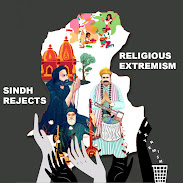The Splendor of Sufism in Sindh: A Golden Era Before Arab Invasion
Sindh has always been known for it's Sufi culture and love for humanity. The teachings of Sufism have been deeply rooted in the hearts of the Sindhi people, and it is considered as one of the pillars of Sindhi Nation. However, the introduction of Muhammad Bin Qasim,as a hero in our text books , has changed the course of history, and this has led to the rise of religious extremism in the region.
Before the arrival of Muhammad Bin Qasim in Sindh, the land was a hub of Sufi culture, where people of different religions lived in harmony. Sufi saints like Sachal Sarmast, Shah Abdul Latif Bhittai, and others propagated the message of love and humanity, which brought people of different faiths together. The teachings of Sufism in Sindh emphasized the importance of love, tolerance, and harmony, which led to the creation of a peaceful society.
But after the introduction of arab bandit Muhammad Qasim in our text books created a shift in the narrative, where the importance of Sufism and love was replaced by the ideology of religious extremism. The education system started promoting a narrow-mindedness which led to the marginalization of other religions and cultures.
The rise of religious extremism in Sindh has led to the marginalization of the Sufi culture, which was once the pride of the Sindhi people. The message of love and harmony has been replaced by the message of hate and intolerance. The society, which was once a peaceful one, is now struggling with sectarian violence, extremism, and intolerance.
Solutions: Removing the false celebration of Muhammad bin Qasim as a hero in our textbooks and promoting sufism for religious harmony can be one of the important steps towards preventing religious extremism in Sindh. This can help to promote more inclusive and tolerant narrative, which can counter the extremist ideologies that fuel violence and intolerance.



Comments
Post a Comment